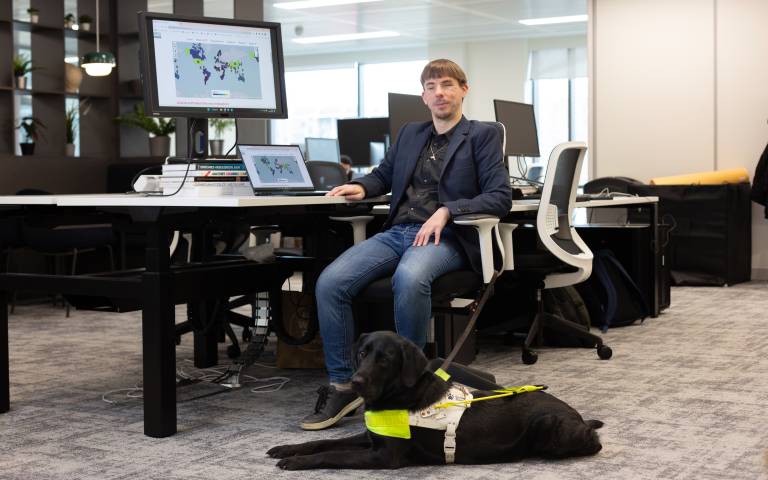UCL East: Dr Daniel Hajas, Innovation Manager at the Global Disability Innovation Hub (GDI Hub)
Dr Daniel Hajas and the Global Disability Innovation Hub team accelerate disability innovation for a more just world, where Assistive Technology enables the full participation of disabled people.

3 January 2024
Daniel has first-hand experience of life with a disability, having had low vision in his teenage years and then suddenly finding himself completely blind just before embarking on his university studies.
For him, the opening of the GDI Hub at UCL East marks a step-change in the way assistive technology research is included in a university’s wider ecosystem. “We’re very excited about this and we have been for a long time,” says Daniel. “At UCL East, our disability innovation lab enables us to showcase Assistive Technology concept demonstrations and deliver co-design activities.
“It’s also home to our Disability, Design and Innovation MSc programme, which is powering future leaders in rapidly expanding field of disability innovation.”
Continuing the London 2012 Paralympic ambition
The GDI Hub was set up in 2016, a legacy of the London 2012 Paralympic Games. Two of its co-founders – Vicki Austin and Iain McKinnon – are integral members of the London Legacy Development Corporation, responsible for continued growth of Queen Elizabeth Olympic Park. Third co-founder Cathy Holloway is a Professor at UCL’s Interaction Centre, and a leading global expert in Assistive Technology.
“UCL East is at the heart of where it all began,” says Daniel. “It’s a vivid hub that will engage the East London community in disability innovation design and product development.”
The GDI Hub is the World Health Organisation’s first Global Collaborating Centre for Research on Assistive Technology. This new lab will bring together research from multiple pathways – including technology and psychology – to amplify the value and impact of assistive technology.
“As an interdisciplinary team, we’re able tap into expertise from across UCL. My role in innovation naturally sits in the middle of lots of different research strands, enabling a creative multi-disciplinary approach,” Daniel adds. “The potential of Assistive Technology to change lives is huge. I’m so excited to see what we can achieve by working with diverse communities both within and beyond UCL East.”
A personal connection
Daniel’s passion for GDI Hub is personal. Growing up in Croatia as a visually impaired teenager, he was almost at the end of his studies at an international high school when his retina detached suddenly.
“I went completely blind. First in my right eye then very shortly after in my left,” he says. “I had to learn pretty much everything from scratch, from how to pour a glass of water to how to send an email, do my assignments and so on.
“I was passionate about science, physics and in particular, mathematics. I also wanted to study at an English-speaking university. So, I had a dilemma. Assistive technology for blind people at the time didn’t really read equations, so physics was clearly more challenging than a history degree, for example. But nevertheless, heart won over mind.”
I realised that whilst I'm hacking my way through, finding solutions on how to make my own life easier, I can also learn about how to do this for other people. How can I help other blind learners to access science?”
“
Daniel studied Theoretical Physics at the University of Sussex, but while scratching his physics itch, he also found himself spending a lot of time exploring his own disability. He says: “I realised that whilst I'm hacking my way through, finding solutions on how to make my own life easier, I can also learn about how to do this for other people. How can I help other blind learners to access science?”
He conceptualised an idea for ‘Tactile Graphics Display’ – a board that’s connected to a computer or mobile with tactile pixels on its surface that can be raised or lowered to represent graphs, diagrams and other visual information. He then presented it at a student event, after which a conversation with someone from the university’s startup accelerator led him to build a startup around the concept with a team of like-minded course mates.
While this venture was short-lived, the research involved inspired Daniel to do a PhD focusing on Human Computing Interaction (HCI), Science Communication, Accessibility and Haptics.
Having subsequently been introduced to GDI Hub’s academic director Professor Cathy Holloway by his PhD supervisor, Daniel soon found it to be the perfect place to put his ideas and skillset into action and began his innovation role at the GDI Hub in 2021. “It nicely packages up all the things I've been doing in the last 8 to 10 years,” he says.
“From my entrepreneurial experience to my lived experience as a blind person to my PhD research. I feel like this is the ultimate place I want to be.”
The future of accessibility
As the GDI Hub continues to grow, Daniel’s role in innovation is ever more crucial. From international research to future-first technology, he sits at the intersection of the different ecosystems. “I work with researchers, PhD students, and academics as well as the entrepreneurs who are coming through the pipelines of our programmes and projects,”
Daniel has worn many hats in his career so far, and he’s looking forward to a period of learning and growing in his current role. He says: “I took on the challenge of studying something I knew would be difficult, and not something that I was less passionate about that might have been easier. I’m proud of the choice I made and it’s really paid me back in terms of the rewards, the learnings and the skills I got out of it.”
Links
UCL Giving
UCL East
UCL Global Disability Innovation Hub
Image
Image by John Moloney.
 Close
Close

